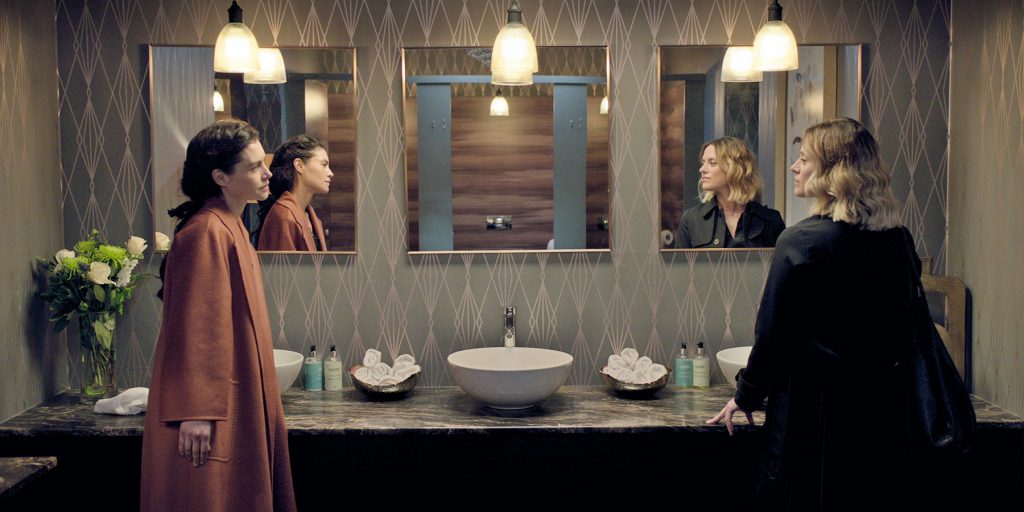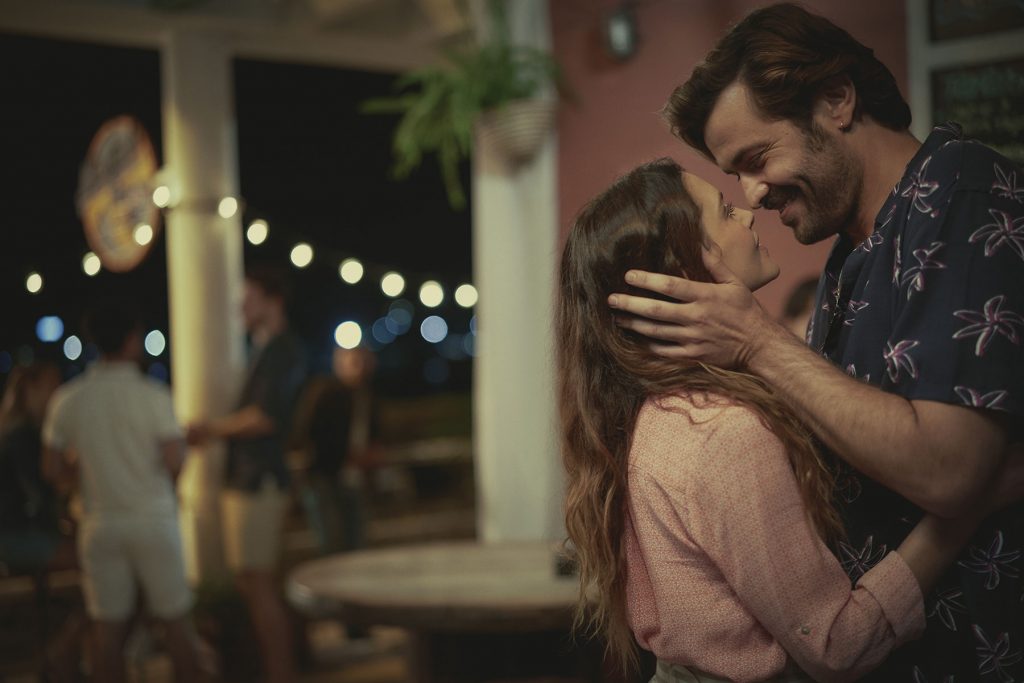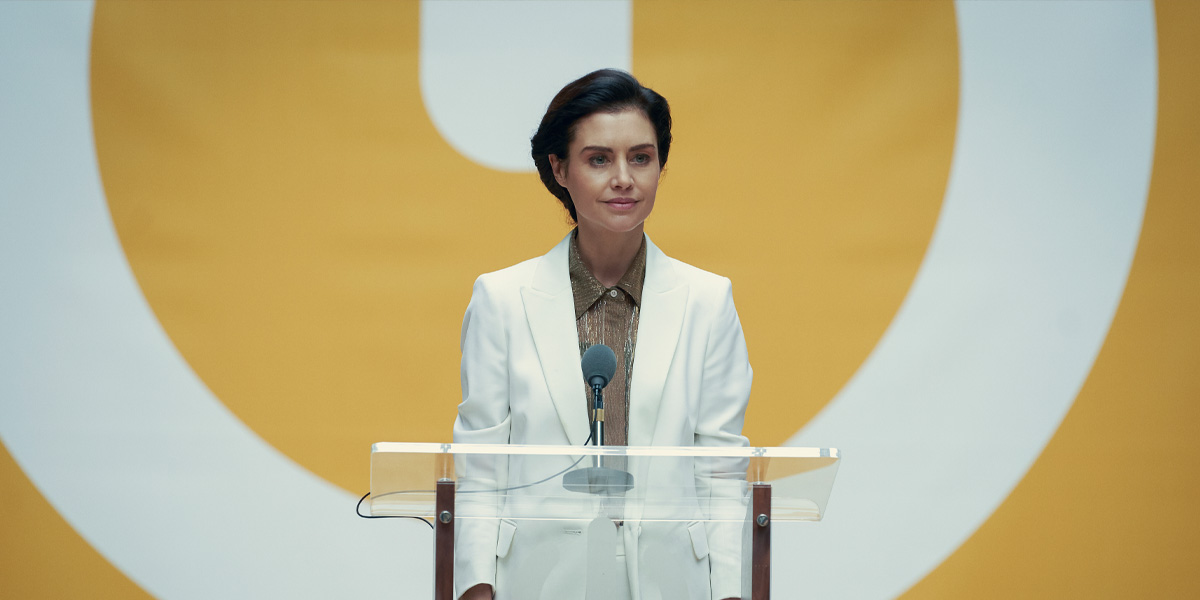Though Netflix’s The One uses recycled tropes to explore the world of DNA-based dating, it’s still worth watching for its intriguing subject matter and great performances from Zoë Tapper and Eric Kofi-Abrefa.
If you’ve started watching Netflix‘s The One, chances are you found its premise intriguing. After all, the idea of finding “the one true love” has been instilled into us since we were children, with all the prince charmings, the fairytale worlds, and the happy endings we’ve read, watched and dreamt about for many years. So, whether you’ve been disappointed by too many Tinder dates gone wrong or you’ve been following FB groups like Disney Gave Me Unrealistic Expectations About Love pretty much since Facebook’s origins, you probably decided to give The One a watch because you’re interested in the questions it raises. What if our DNA was the key to finding our perfect partner? Would relationships last longer if each of us knew that the person we’re dating is genetically predisposed to love us, and therefore less likely to leave us? Would pre-existing relationships survive, or would they crumble under the weight of the possible perfect matches awaiting us? Would new relationships feel more complete, or would we eventually grow tired of our partners and leave them for someone else? And, above all, would we be happier?
Based on John Marrs’ bestselling novel with the same name and set in London “five minutes in the future”, The One sets off to explore all these issues, while also engaging us with a story carried by many players, each with a secret to hide, and a puzzle whose pieces are slowly uncovered, one episode after the other, until the mystery is unsolved and the heroes and villains are revealed. At the centre of it all is Rebecca Webb (Hannah Ware, of Boss), a DNA researcher turned enterpreneur who found a way to pair people with their soulmates based on certain genetic traits they share. When we first meet Rebecca, she’s giving an enthusiastic presentation to a crowd of hopeful attendees, introducing her own soulmate to them, as she was the first person to get matched and can therefore vouch for the validity of her system. Not that she would need to, as her company, MatchDNA, is a highly successful enterprise, and the matching system has already taken over the world.
But things are about to change for Rebecca, as the world she has meticulously crafted for herself is about to crumble. The body of Rebecca’s former friend and associate Ben (Amir El-Masry, of Limbo and The Night Manager) is discovered in the Thames, and police officers Kate (Zoë Tapper, of Survivors) and Nick (Gregg Chillin, of A Discovery of Witches) open a murder investigation. But Rebecca’s troubles have only just begun, as she still doesn’t know who she can trust within her company. As she finds herself dealing with ghosts from her past and facing new threats to her future, a battle begins. Rebecca is determined not to lose control of her own company, and, as we watch her make a series of questionable decisions, we are left wondering about her motives, and debating over her involvement in Ben’s death.

But that’s not all that happens in The One. Over the course of eight episodes, we are introduced to a series of characters, some of whom are connected to Rebecca, that are meant to show the many sides of a system like MatchDNA, and the many ways in which the world could be affected by the possibility of finding a perfect match becoming a certainty. Kate herself is dealing with her own personal issues, as her newly found match, Sofía (Jana Pérez, of Cinderella) has just flown all the way from Spain to meet her, unwittingly bringing an entire family of complications with her, and taking up much of a lovestruck Kate’s time. Another important player is Hannah (Lois Chimimba, of Doctor Who), a woman whose own insecurities have prompted her to befriend her loving boyfriend Mark‘s (Eric Kofi-Abrefa, of Jurassic World: Fallen Kingdom and BBC’s Sherlock) perfect match, having secretly entered his DNA in the matching system.
All these and many more characters are meant to shed light on the issues our society would face if such system was ever implemented. There’s the perfectly happy relationship compromised by jealousy, there’s the doubt sparked by the awareness of a very tangible possibility not that far out of reach, and there’s the heartache caused by the knowledge of what it feels like to be with a perfect match that doesn’t reciprocate one’s love. And then there’s the matter of feeling entirely comfortable with a new match, trusting a total stranger with intimate details without even stopping to consider whether or not this stranger is trustworthy and truthful.
The One needs to be commended for attempting to tackle the many sides of its fascinating premise, and the first three episodes of the series are effective at reeling you into a world that bears many similarities with our own while dazzling you with stylish aesthetics and giving you a puzzle to solve. Yet, what is penalised by the show’s carefully contructed visuals and storyline is its narrative development. In the efforts to tie all these separate threads together and make them come full circle at the end, The One bases its entire plot on the one piece of the mystery we’ve yet to uncover. The choice to show glimpses of Ben’s death in Episode 1 and only reveal the scene in its entirety at the end is deliberate — and clearly intended to make us watch all eight episodes — but not entirely successful, as the event in question is neither strong nor sensational enough to hold together an entire season. By Episode 5, you’ll have either guessed the show’s ending or grown tired of its constant flashbacks to that one event, and you’ll be craving for more scenes of your favourite characters interacting with one another.

Speaking of The One‘s characters, the many compelling personalities that make an appearance in the show are both what drive us to keep watching it and what serve to highlight its second flaw, which resides in its characterisation. Kate, Sofía, Hanna, Mark, and many more characters are — some more than others — intriguing enough, but they lose credibility the moment they begin to share a connection, as it becomes clear that their actions are driven by necessity, and so their choices often feel out of character. Especially in the second half of the season, it becomes painfully clear that The One‘s writer (Howard Overman, of Misfits) prioritized the series’ central mystery over a desire to create well-rounded protagonists that make consistent choices: there’s a point when many of their storylines begin to take very convenient turns that benefit the narrative but discourage our investment in the show, as they instantly begin to lack credibility.
Another missed opportunity lies in The One‘s real villain (whose name I won’t reveal, as that would spoil the show for you), which was clearly intended to be one of those characters we love despite their evil behaviour. Think of The Silence of the Lambs‘ Hannibal Lecter, Fight Club‘s Tyler Durden, Sherlock‘s Jim Moriarty, Game of Thrones‘ Cersei Lannister. What all these characters have in common is that, even if they do terrible, immoral things, we still can’t help but like them, and often think of them as the most fascinating aspect of the film or series they’re in. Like these fascinating, evil personalities, The One‘s villain does terrible things that often harm some of the show’s most likeable characters. Unlike them, The One‘s villain lacks the necessary charisma to make us revel in their immorality, and to make us want to keep pressing play just to watch them be evil. Though the show often does manage to drive us to question its characters’ motives and switch sympathies, it offers us a villain that we don’t like very much, but we don’t entirely hate either, and that simply isn’t neither interesting nor evil enough to make a mark.
That said, The One is not a bad show altogether. If you shift your focus from its protagonist onto its supporting characters, you’ll find plenty of material to keep you invested enough in the narrative to make you want to watch all eight episodes. The series’ real standouts are Zoë Tapper and Eric Kofi-Abrefa, who’ll be the reason you’ll want to keep watching till the end. Tapper’s magnetic screen presence and the authenticity of her performance make every scene she’s in flow at a different pace, aided by what’s undeniably the most well-written and genuinely interesting character arc of the entire show. Mark is unfortunately not as multilayered a character, but Kofi-Abreva still demands our attention by making the most of the little screentime he’s given and connecting with us with an emotional intensity that’s really quite impressive, given the lack of direction that often defines his character.
Perhaps The One‘s biggest missed opportunity is that it never really explores the themes that drew us to it in the first place, focusing on the few secrets unveiled by the murder investigation and only offering a superficial analysis of love and relationships, without really tapping into the psychological thriller genre. Yet, though the show ends up feeling not quite as enthralling and thought-provoking as it could have been, it can still make for an enjoyable, easy watch if you don’t take it too seriously. A second season seems inevitable, given the show’s ratings and Season 1’s ending: here’s hoping more time is spent on consistent characterisation and narrative development, so that a more compelling Season 2 can arise out of a flawed beginning, and that its talented cast can be given a chance to shine.

